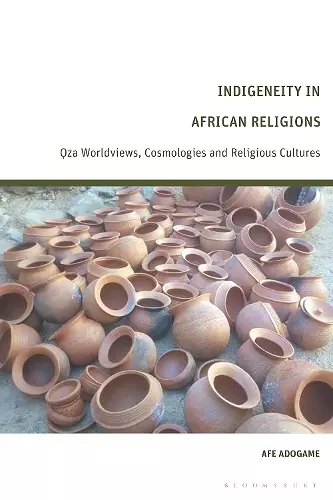Indigeneity in African Religions
Oza Worldviews, Cosmologies and Religious Cultures
Format:Paperback
Publisher:Bloomsbury Publishing PLC
Published:29th Jun '23
£28.99
Supplier delay - available to order, but may take longer than usual.

Offers an ethnographic account of the Oza people of south-western Nigeria, showing their relevance to understanding indigeneity and African religion.
Based on religious ethnography, in-depth interviews and archival data, Indigeneity in African Religions explores the historical origins, worldviews, cosmologies, ritual symbolism and praxis of the indigenous Oza people in South West Nigeria. The author’s locationality and positionality plugs the book within decolonizing knowledges and indigeneity discourses, thus unpacking the complexity of “indigeneity” and contributing to its conceptual understanding within socioreligious change in contemporary Africa.
The future of Oza indigeneity in the face of modernity is illuminated against the backlash of encounters, contestations with multiple hegemonies, transmissions of Christianity and Islam and indigenous (re)appropriations. Thus, any theorizations of such encounters must be cognizant of instantiations of indigeneity politics and identity, culture, tradition and power dynamics. Through decolonizing burdens of history, memory and method, Afe Adogame demonstrates a framework of understanding Oza indigenous religious,sociocultural and political imaginaries.
Contributes importantly to the study of African and other Indigenous religions. * Journal of Religion in Africa *
Afe Adogame’s highly readable book has given great meaning to the existence of a small group in a culturally diverse milieu. By paying crucial attention to the complexities of the Oza people’s historical, cultural and religious imaginations over the Longue Duree, the author has used an interpretive framework that discusses the present reality of the Oza people in light of their past experiences. This book will for a long time remain a contemporary benchmark for the reconstruction of the story of the Oza people. * Olutayo C. Adesina, Professor of History, University of Ibadan, Nigeria *
This book offers a rich, in-depth account of the religious culture and worldview of the Oza people in Nigeria and their connections to all spheres of life. Mapping religious change from the 19th – early 21st century, Afe Adogame demonstrates how indigenous religions are crucial for understanding not only the past, but also African futures. * Adriaan van Klinken, Professor of Religion and African Studies, University of Leeds, UK *
Afe Adogame’s important and timely book provides an insightful and rich contribution to the indigenous religious tradition of Africa. Drawing on substantial ethnographic archival materials, and analyzed through multidisciplinary approaches, Adogame renews conversations on a whole array of phenomena, including cosmology, mythology, kingship, rites of passage, ritualism and gender dynamics, in ways that reinvigorate modern scholarship in African religious traditions. The work also advances current scholarship on indigeneity and demonstrates valuable paths on how best to conduct deep research on the subject. * Jacob K. Olupona is Professor of African Religious Traditions, Harvard Divinity School, with a joint appointment as Professor of African and African American Studies in the Faculty of Arts and Sciences at Harvard University *
Afe Adogame, a historian of religions, writes as a cultural insider and a mother-tongue speaker of the Oza language but who is fully aware of the potential pitfall of bias fraught with writing about one’s ethnic group. ... Indigeneity in African Religions is a welcome addition to the growing literature in the historiography of smaller ethnic groups in Africa and elsewhere, whose histories, worldviews, beliefs, and practices have historically not received adequate scholarly attention. ... Even the modern Oza will find that this book fills an important gap in the historiography of their people group. * Nova Religio *
ISBN: 9781350274358
Dimensions: unknown
Weight: unknown
288 pages